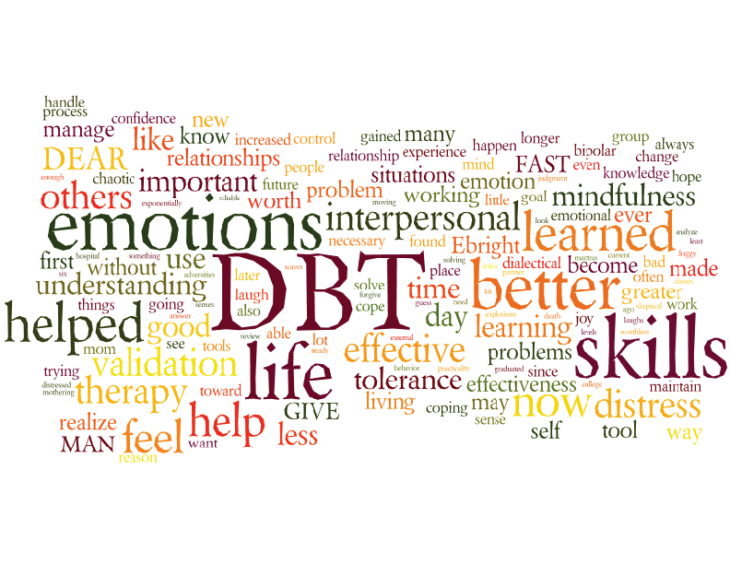Dialectical behavior therapy (DBT) is a form of psychotherapy that originated in the 1980s. It was initially devised by psychologist Marsha M. Linehan to treat people with a borderline personality disorder. However, in recent decades, it has been used to treat an array of mental illnesses.
To better understand what DBT is and how it works, let’s first break down the term dialectical. The Cambridge English Dictionary defines dialectic as “a way of discovering what is true by considering opposite theories.” Dialectical is about the existence of opposites, which, according to Psychology Today, is exactly how DBT works. This type of cognitive therapy integrates two contrasting strategies: acceptance and change. The therapist works with their client to first gain acceptance (i.e. that their experiences are valid), which is followed by a discourse on the importance of change (i.e. getting them to recognize the changes they need to make in order to move forward).
Dialectical behavior therapy has proven to be particularly successful among teenagers. It is one form of treatment that can be received at a residential treatment center, such as Elevations RTC. Elevations RTC is a Syracuse, Utah-based facility that helps adolescents ages 13 to 18 overcome challenges stemming from mental health problems, emotional disorders, learning disorders, substance use, and other underlying issues. They are uniquely focused on providing a co-educational, real-world residential environment with a combination of intensive psychiatric treatment and personalized care. Unlike many other residential treatment programs, their clinical team is fully certified in DBT. You can visit their website at https://elevationsrtc.com.

Source: Get Help Israel
Who Can DBT Help?
DBT is typically regarded as being a form of therapy primarily for adolescents and young adults, however, studies have shown it can be effective in children between the ages of 8 and 13, as well as in older adults. Beyond age, DBT is recommended for anyone experiencing difficulty managing their emotions or behavior. More specifically, dialectical behavior therapy is thought to help those suffering from depression and anxiety, suicidal ideation, mood disorders, substance abuse, self-harm, anger outbursts, eating disorders, post-traumatic stress disorder, or family and peer conflict.
How Can DBT Help?
Elevations RTC is a strong proponent of DBT, which works through five components. It begins with a skills training group to address four main skills that clients are to work on throughout the program (more on those below). Next is the individual psychotherapy sessions, which typically last between 60 and 90 minutes each. In-the-moment coaching is the third component, which utilizes a combination of telephone and in-person coaching to provide real-time support. Case management is the fourth phase, teaching clients how to be independent. Finally, the DBT consultation team, which consists of skills therapists, case managers, and more, work to support the therapists who provide DBT to ensure they can continue offering the best treatment possible.

Source: Elevations RTC
The Four Skills of DBT
As mentioned above, a skills training group is an essential component of any DBT program, such as that offered by Elevations RTC. Training is often divided into four key skills, which are intended to be practiced between group sessions.
Stage 1: The first stage begins with the person being deeply unhappy and exhibiting out-of-control behavior. The goal of this stage is centered on mindfulness, to accept and tolerate one’s emotions and eventually achieve behavioral control over them.
Stage 2: The second stage builds on the first and involves making a transition towards the tolerance of distress. It is about accepting oneself and one’s circumstances in a non-judgmental way. From there, this phase focuses on handling negative situations calmly, enabling one to make wise decisions.
Stage 3: The next step is emotional regulation. DBT proposes many strategies for emotional regulation, including identifying and labeling emotions, increasing mindfulness to current emotions, taking opposite actions, and identifying obstacles to changing emotions.
Stage 4: Interpersonal effectiveness is the final stage, in which one learns to deal with interpersonal conflict. Learning to say no and to ask for what they need are key steps in this process.

Source: barringtonbhw.com
The ultimate goal is always to achieve a balance between acceptance and change, realizing what their triggers are that led to certain mental states, and then understanding which coping mechanism to apply to help them deal with these negative thoughts, feelings, or behaviors.haviors.
